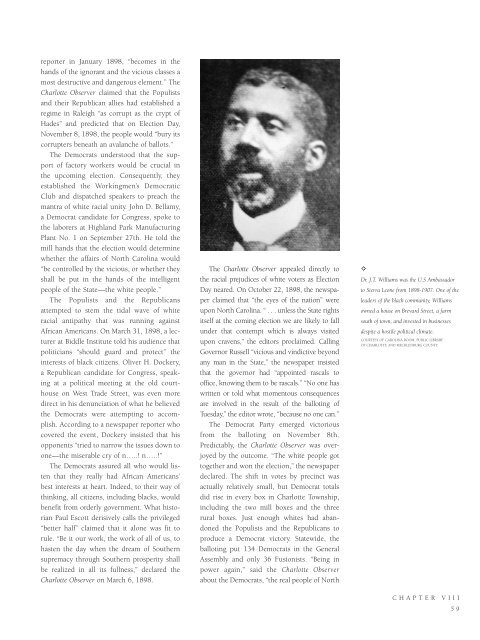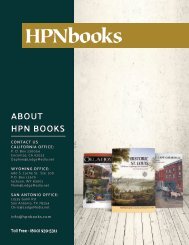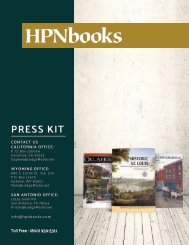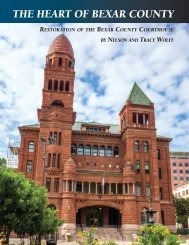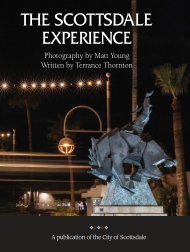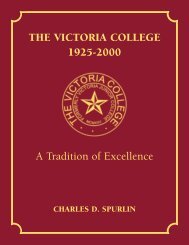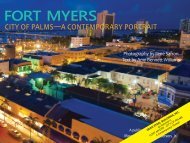Historic Charlotte
An illustrated history of the City of Charlotte and the Mecklenburg County area, paired with the histories of companies, families and organizations that make the region great.
An illustrated history of the City of Charlotte and the Mecklenburg County area, paired with the histories of companies, families and organizations that make the region great.
You also want an ePaper? Increase the reach of your titles
YUMPU automatically turns print PDFs into web optimized ePapers that Google loves.
eporter in January 1898, “becomes in the<br />
hands of the ignorant and the vicious classes a<br />
most destructive and dangerous element.” The<br />
<strong>Charlotte</strong> Observer claimed that the Populists<br />
and their Republican allies had established a<br />
regime in Raleigh “as corrupt as the crypt of<br />
Hades” and predicted that on Election Day,<br />
November 8, 1898, the people would “bury its<br />
corrupters beneath an avalanche of ballots.”<br />
The Democrats understood that the support<br />
of factory workers would be crucial in<br />
the upcoming election. Consequently, they<br />
established the Workingmen’s Democratic<br />
Club and dispatched speakers to preach the<br />
mantra of white racial unity. John D. Bellamy,<br />
a Democrat candidate for Congress, spoke to<br />
the laborers at Highland Park Manufacturing<br />
Plant No. 1 on September 27th. He told the<br />
mill hands that the election would determine<br />
whether the affairs of North Carolina would<br />
“be controlled by the vicious, or whether they<br />
shall be put in the hands of the intelligent<br />
people of the State—the white people.”<br />
The Populists and the Republicans<br />
attempted to stem the tidal wave of white<br />
racial antipathy that was running against<br />
African Americans. On March 31, 1898, a lecturer<br />
at Biddle Institute told his audience that<br />
politicians “should guard and protect” the<br />
interests of black citizens. Oliver H. Dockery,<br />
a Republican candidate for Congress, speaking<br />
at a political meeting at the old courthouse<br />
on West Trade Street, was even more<br />
direct in his denunciation of what he believed<br />
the Democrats were attempting to accomplish.<br />
According to a newspaper reporter who<br />
covered the event, Dockery insisted that his<br />
opponents “tried to narrow the issues down to<br />
one—the miserable cry of n…..! n…..!”<br />
The Democrats assured all who would listen<br />
that they really had African Americans’<br />
best interests at heart. Indeed, to their way of<br />
thinking, all citizens, including blacks, would<br />
benefit from orderly government. What historian<br />
Paul Escott derisively calls the privileged<br />
“better half” claimed that it alone was fit to<br />
rule. “Be it our work, the work of all of us, to<br />
hasten the day when the dream of Southern<br />
supremacy through Southern prosperity shall<br />
be realized in all its fullness,” declared the<br />
<strong>Charlotte</strong> Observer on March 6, 1898.<br />
The <strong>Charlotte</strong> Observer appealed directly to<br />
the racial prejudices of white voters as Election<br />
Day neared. On October 22, 1898, the newspaper<br />
claimed that “the eyes of the nation” were<br />
upon North Carolina. “ . . . unless the State rights<br />
itself at the coming election we are likely to fall<br />
under that contempt which is always visited<br />
upon cravens,” the editors proclaimed. Calling<br />
Governor Russell “vicious and vindictive beyond<br />
any man in the State,” the newspaper insisted<br />
that the governor had “appointed rascals to<br />
office, knowing them to be rascals.” “No one has<br />
written or told what momentous consequences<br />
are involved in the result of the balloting of<br />
Tuesday,” the editor wrote, “because no one can.”<br />
The Democrat Party emerged victorious<br />
from the balloting on November 8th.<br />
Predictably, the <strong>Charlotte</strong> Observer was overjoyed<br />
by the outcome. “The white people got<br />
together and won the election,” the newspaper<br />
declared. The shift in votes by precinct was<br />
actually relatively small, but Democrat totals<br />
did rise in every box in <strong>Charlotte</strong> Township,<br />
including the two mill boxes and the three<br />
rural boxes. Just enough whites had abandoned<br />
the Populists and the Republicans to<br />
produce a Democrat victory. Statewide, the<br />
balloting put 134 Democrats in the General<br />
Assembly and only 36 Fusionists. “Being in<br />
power again,” said the <strong>Charlotte</strong> Observer<br />
about the Democrats, “the real people of North<br />
✧<br />
Dr. J.T. Williams was the U.S Ambassador<br />
to Sierra Leone from 1898-1907. One of the<br />
leaders of the black community, Williams<br />
owned a house on Brevard Street, a farm<br />
south of town, and invested in businesses<br />
despite a hostile political climate.<br />
COURTESY OF CAROLINA ROOM, PUBLIC LIBRARY<br />
OF CHARLOTTE AND MECKLENBURG COUNTY.<br />
CHAPTER VIII<br />
59


